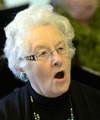December
Ageing Creatively: the art of growing older

New research which aims to find out if the arts can improve wellbeing in later life is being carried out at Newcastle University.
The healing nature of the creative arts has a long history and recent research has linked them to improved wellbeing in later life. However, creativity is notoriously difficult to study and, beyond anecdotal evidence, we don’t really understand why singing and painting, for example, may be good for us.
Previous research has shown links between creative activities and wellbeing, but many factors can explain such associations; for example, those in better health may simply have greater opportunity to be creatively active. It is therefore important to establish how engaging in the arts leads to improved wellbeing.
The researchers involved in the Ageing Creatively study want to close an existing gap in the field of arts and health as few previous studies exploring the relationship between the arts and wellbeing explain or test their methods.
The team has recruited 60 participants, aged 55 and over, to help them find out more. They have taken part in workshops based around creative writing, studying short stories, creating a piece of art, viewing art and listening to music and singing.
Professor Eric Cross, Dean of Cultural Affairs at Newcastle University, who is leading the project said: “There is a growing body of work that shows that keeping your mind active as you get older is good for you.
“This project has been designed to answer questions such as: Does writing a story make more of a difference than simply reading one? Or does listening to music have more or less of an effect compared to singing in a choir?”
Professor Tom Kirkwood, Associate Dean of Ageing at Newcastle University, said: “Newcastle University is world renowned for its research into the effects of ageing. But this is the first time that we will have looked at the role of creativity in wellbeing on later life.
“There are other studies which have looked at this but a common problem is that they have not been rigorously tested or explained their methods of investigation. One key part of this study will be to develop robust methods of measuring the effect creativity has and the best way to measure it.”
“Once we have done this then we can start to answer important questions such as ‘should creative activities be prescribed by GPs or be offered by local councils as part of social programmes?’”
The 18-month pilot project is a collaboration between the University’s Faculty of Humanities and Social Sciences and the Faculty of Medical Sciences, supported by the Newcastle Centre for Literary Arts, Newcastle City Libraries, Tyne & Wear Archives & Museums, and The Sage Gateshead.
The research has been funded from the Research Councils UK initiative on Lifelong Health and Wellbeing, led by the Medical Research Council. Lessons learned from this pilot study will be used to create a larger study that explores the issues further. It will also support the existing good practice of community arts organisations and cultural venues in the North-East and across the country.
Ends
Photographs by North News
published on: 12 December 2012
